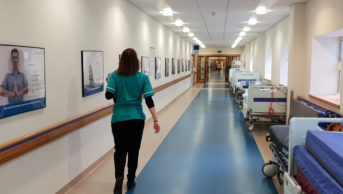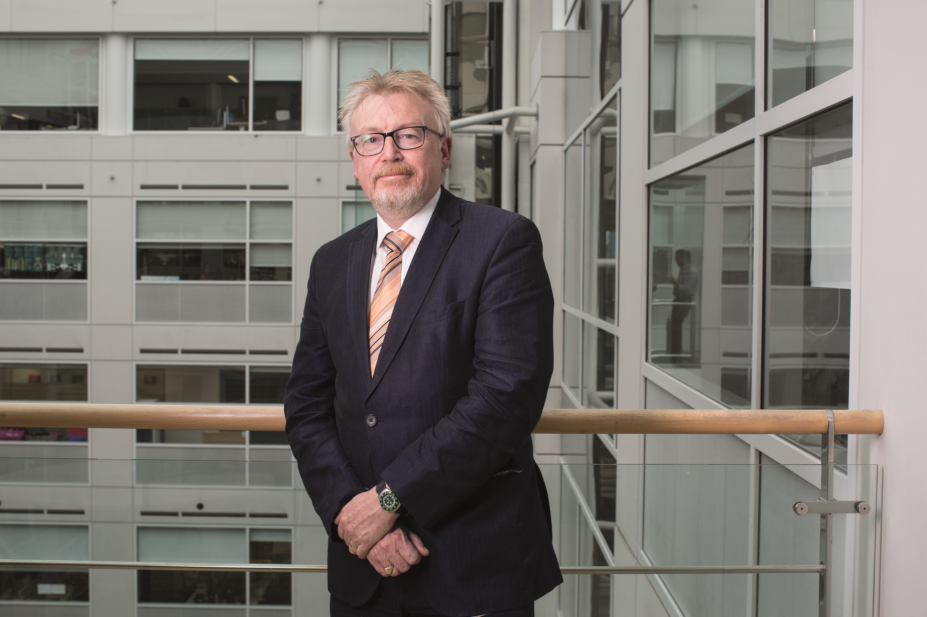
Jeff Gilbert
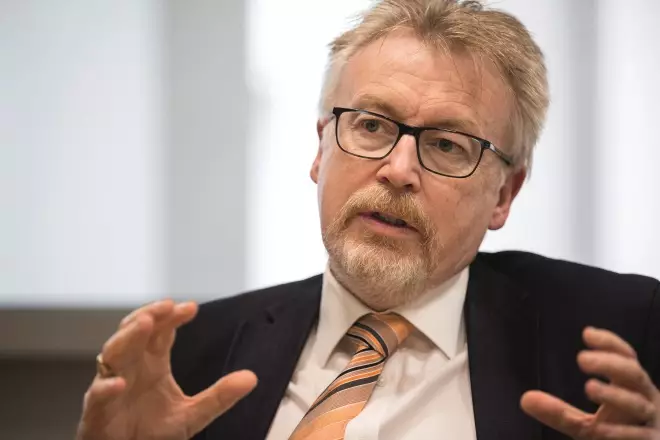
Source: Jeff Gilbert
Keith Ridge is a busy man. It has taken many emails with his office to get a date in the diary for this interview with The
Pharmaceutical Journal. But here we are, on a summer day in a sweltering room at NHS England’s headquarters with the man himself, and two members of his media team.
Ridge is not known for his tolerance of journalists, but he carefully answers all our questions, barely touching the water bottle resting beside him. After 12 years as chief pharmaceutical officer at NHS England, Ridge is a bit greyer than when he first began and is perhaps a touch battleworn, but he has overseen much change in pharmacy and had a major influence on how the profession has developed — and he has some big ideas for its future.
But Ridge remains a controversial figure for many pharmacists, particularly those affected by the funding cuts in the community which came into force in December 2016. Although he may have some regrets about this, he is keen to stress that the profession is at a crossroads and that major new opportunities are opening up for pharmacy, if it is willing to seize them.
You can see the massive impact that a clinical pharmacist is having in terms of improving outcomes, reducing inappropriate medication, training and blending right into the general practice team
It is two years since the scheme to deploy pharmacists in GP surgeries began — what evidence have you seen that they are making a difference?
I have visited practices, such as the Westbourne Practice in Bournemouth, and you can see the massive impact that a clinical pharmacist is having in terms of improving outcomes, reducing inappropriate medication, training and blending right into the general practice team. We have funded the evaluation of the NHS England programme and it’s showing a positive outcome in terms of the integration of pharmacists into practices. They are spending something like 80% of their time on clinical activities. One of my fears was that they would get dragged into medicines management activity, and there is some of that, but they are spending most of their time on front-line patient activity, carrying out structured medication reviews in a way that was not happening sufficiently in general practice before.
Should there be a GP pharmacist linked to every practice, as the British Medical Association says?
The British Medical Association has a point. Where we are going with primary care networks, you can create a system whereby, at a minimum, practices have access to the expertise they need. I see no reason why we can’t use that to deploy more pharmacists into general practice in England. It would be done on a population basis, but, yes, they will have access to, in my view, a pharmacist across all of general practice. That may take some time.
A massive change.
It is.
Are you planning to renew the NHS Urgent Medicine Supply Advanced Service in September 2018?
We have discussed that — it’s going through a process. It’s proving to be successful and my view as chair of that group is we can’t do without it, so let’s see what happens in terms of actually signing on the dotted line.
So you are hopeful?
I am hopeful and I think at minimum, it would be an extension of the pilot in terms of running it longer. Obviously, the department need to consider where they are with the contractual framework negotiations, but at the same time we have got to ensure that patients still benefit from what is obviously a successful service. I would find it difficult to justify taking it away when it’s pretty obvious that it’s going to become an important part of what community pharmacy does.
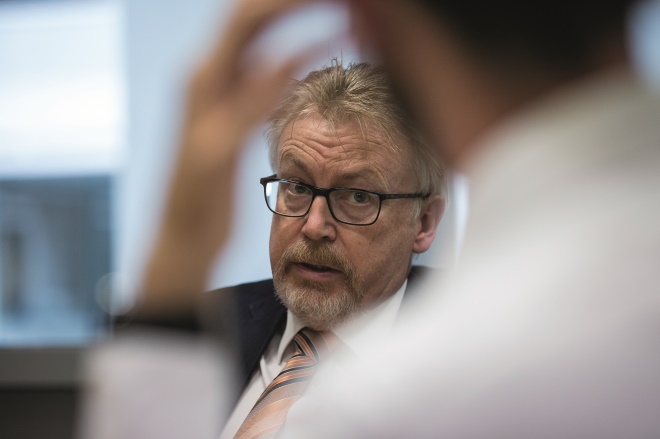
Source: Jeff Gilbert
Have you spoken to the new secretary of state for health and social care yet about pharmacy?
No.
The 111 referral service and the aspiration really to integrate pharmacy and pharmacists into the NHS in many ways have flowed from what was obviously a very difficult period of time
Were you sad to lose Jeremy Hunt?
I worked closely with Hunt on the medication safety work. I was impressed and learnt things from him about the importance of transparency and metrics in a way where they can make a real difference. I enjoyed working with him.
Do you regret the damage the cuts have done to community pharmacy?
The NHS needs to demonstrate its ongoing efficiency and good use of resources. At the time, the evidence was showing that despite the excellent work community pharmacy does — I went to a few pharmacies in west Suffolk on Friday and you just see the great work they are doing; really good stuff. But when you looked at the funding arrangements and the way medicines move across the system, there was no doubt that some change was necessary. I can see some of the pain it’s caused some people and I don’t regret it as someone who is acting on behalf of patients, the public and taxpayers. In many ways it has also begun to stimulate real change in community pharmacy. It’s a bit more complex to say I regret it because I can now see good things coming out of this. The 111 referral service and the aspiration really to integrate pharmacy and pharmacists into the NHS in many ways have flowed from what was obviously a very difficult period of time.
So you regret the pain that it caused, but not the outcome?
Yes, of course I regret the pain it has caused. But I think people might look back on this when I have long gone and actually see this as a watershed moment. I’m sure many people won’t see it like that, but in history that might be how people look at it.
Some say you haven’t been very clear on your vision for community pharmacy going forward, so what is it?
The importance of getting as many low-acuity conditions into community pharmacy as they can confidently deal with is really important. When you look at the 111 referral project in the North East — which has been recently extended — something like 60% of referrals from 111 are being completed in the pharmacy. Those people would have gone to general practice, out-of-hours services or A&E had that not happened, so that is mightily impressive. We are learning as we go along, until finally there will be, no doubt, a discussion about rollout in the entirety.
That’s where we are focusing, together with a considerable emphasis on prevention. We have a ten-year plan where prevention is going to be a really important part. The combination of prevention and urgent care, while others around us may demand other things, is going to be an important core offer that community pharmacy has to deliver to a very high quality and other things will undoubtedly flow beyond that.
And two points on workforce development. It has not been easy to convince community pharmacy to fully engage with our leadership programme, but if community pharmacy is actually going to be commissioned to do this, and things beyond, then it needs to engage. The second point would be me and my equivalents across the UK working closely with the Royal Pharmaceutical Society around foundation training. If we are going to create a sustainable, clinically orientated workforce in pharmacy, a common foundation has to happen. We need to push really hard to make all we are doing in primary care sustainable in the long run; pilots won’t be good enough. We have got to move into a phase, to make it what pharmacy does.
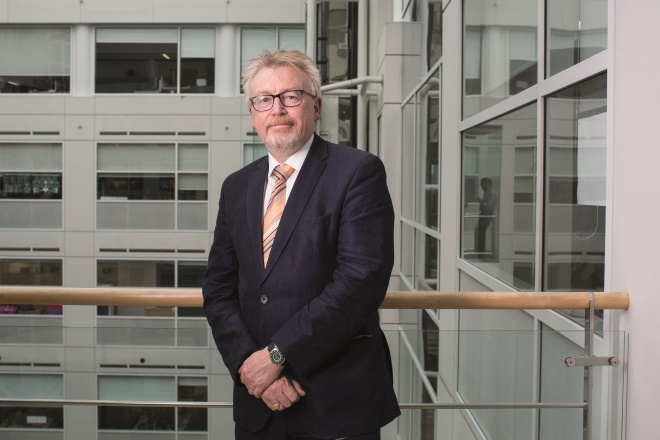
Source: Jeff Gilbert
The final thing I would say is that we are going to use a bit of the integration fund to, fairly quickly across seven areas of the country, look at system leadership in pharmacy and medicines optimisation at sustainability and transformation plan (STP) level. A senior pharmacist would be — in my view — the professional head for pharmacy and medicines optimisation, so beyond pharmacy and having an oversight of how well medicines are used across that STP area. We are laying the foundations for that and will pilot later in 2018.
Pharmacists and practices will play an important part in terms of receiving information about patient’s medication as they come in or go into a hospital
Should every patient have a ‘named’ community pharmacist on discharge?
Community pharmacists have a very important role to play in that, but so do the new kids on the block. We can’t just jump over general practice — we want an integrated system, don’t we? So therefore, pharmacists and practices will play an important part in terms of receiving information about patient’s medication as they come in or go into a hospital. There is an evidence base to say that it makes a difference. [But] I’m not sure about named community pharmacists.
Patients often come out of hospital not knowing why they are on medication and how they are meant to take it. To have a pharmacist there to advise you, surely that is a good idea?
I totally agree, but not only that. One of the best examples I have seen is in Northumberland. I went and did a visit there a year or so ago and the pharmacists were in the practice in the morning and then on the care and older people’s ward in the afternoon. That sort of level of interaction and communication was pretty special.
When people see practices that they are not comfortable with, there have to be mechanisms to speak up
The probe into the scandal at Gosport War Memorial Hospital made an awful lot of headlines, including a lack of evidence that the pharmacists had challenged bad prescribing practices. Should pharmacists be challenging bad prescribing and what should they do if they are not listened to?
OK, this is a top line answer. The government and everybody else will have to think long and hard about the best response and rightly so. I was involved with the post-Shipman enquiry and then what was put in place after that, in terms of the management of control of drugs. Those things were not in place at the time. I need to think carefully about the things that are in place and whether there are any gaps. Speaking as an ex-clinical pharmacist working with doctors, nurses and others at the time, I think teamwork is necessary in order to deliver good, safe, effective care. When people see practices that they are not comfortable with, there have to be mechanisms to speak up. When I think about my career as a chief pharmacist in a hospital, I would encourage a culture in my pharmacy team of speaking up. I would expect and hope that there are mechanisms in place for people to do that.
Are you looking at whether anything should change?
I’m thinking about the government system for controlled drugs.
Are you optimistic about the future of pharmacy?
Oh goodness, yes. It’s fantastic some of the stuff we are doing now. When we set up the General Pharmaceutical Council we had a conflict of interest between the professional regulator and a professional leadership body, and if pharmacy was going to develop into a much more clinical profession that needed to be sorted out. Hence the establishment of the General Pharmaceutical Council to give the public the confidence that clinical pharmacy practice was in their interests and as good as it could be. So when I look back on that, that for me was probably one of the most fundamental building blocks to where we have got to today.
I’m a public sector person through and through, really — it’s all about patients, the public and the taxpayers for me — so if we can markedly improve outcomes for patients and the public with medicines that they actually need and that are delivered well in a high-quality way, then that will be great as far as I’m concerned.

